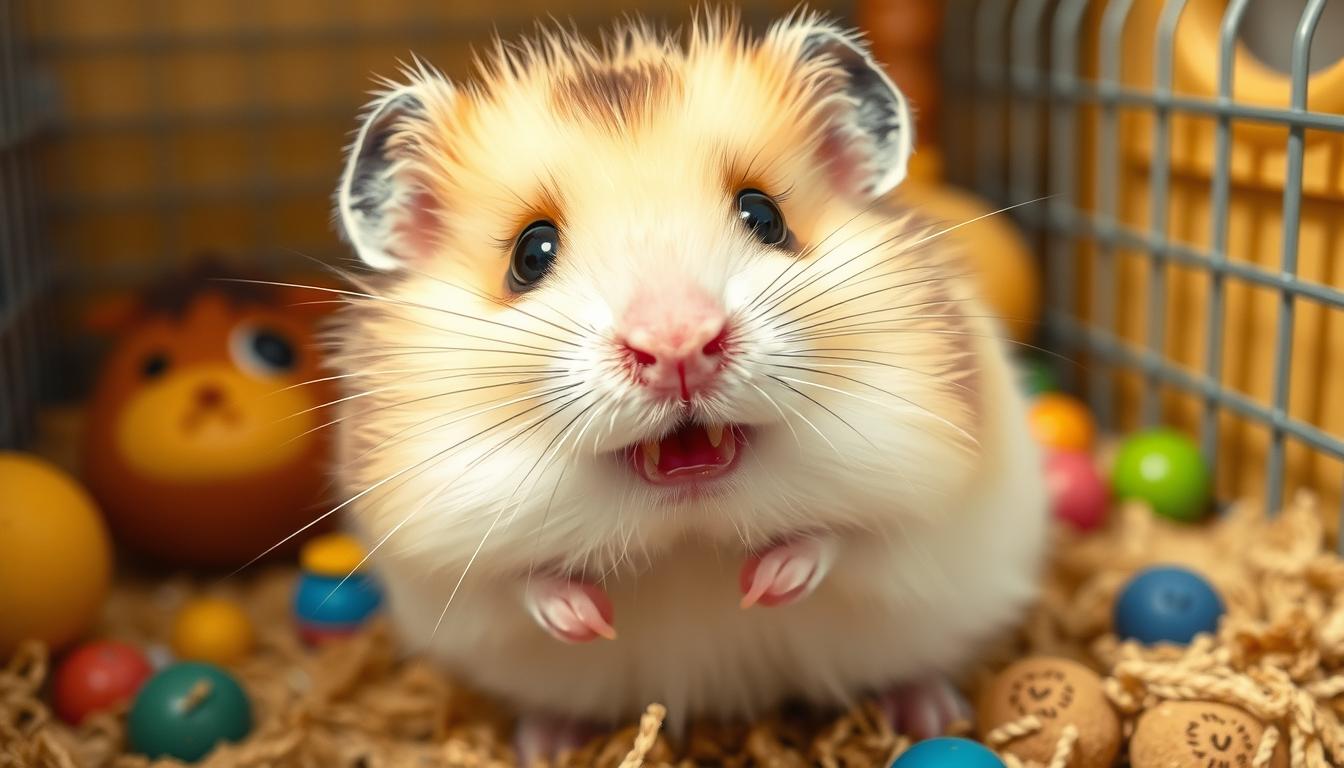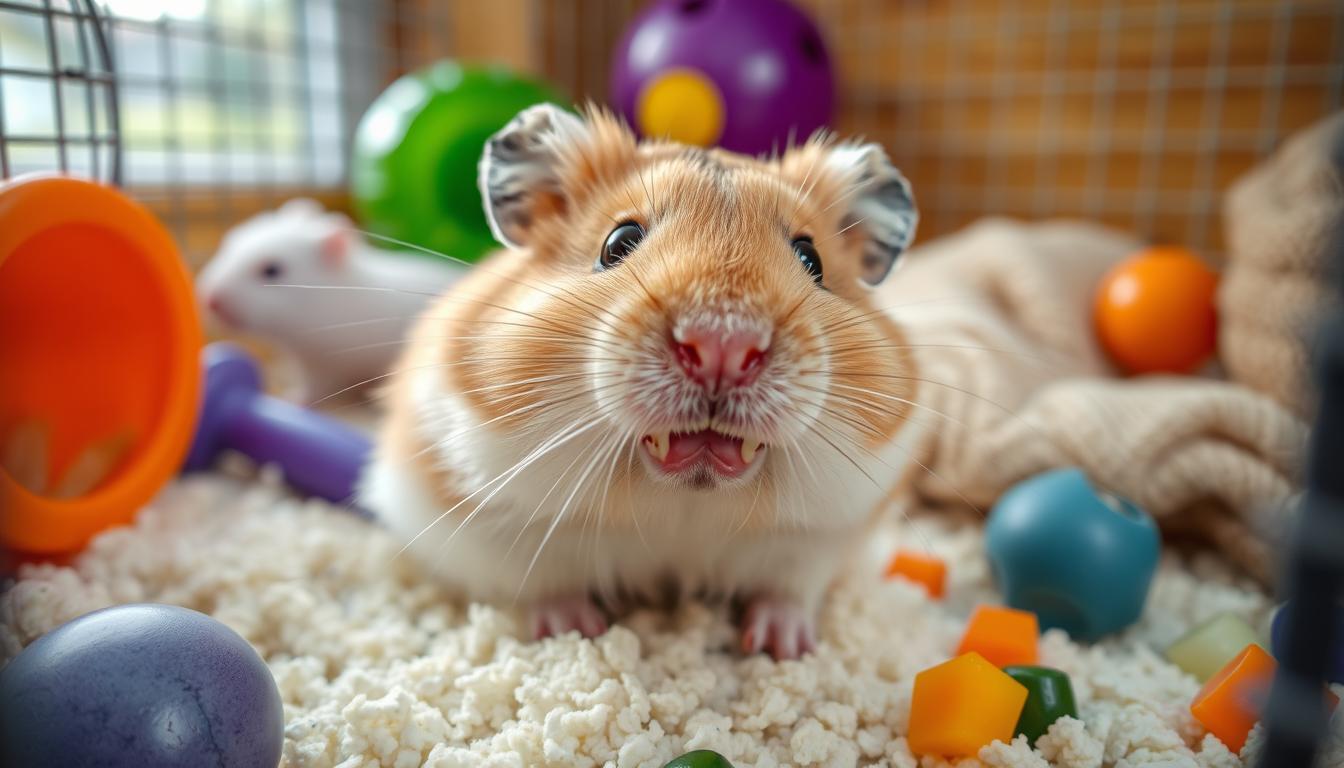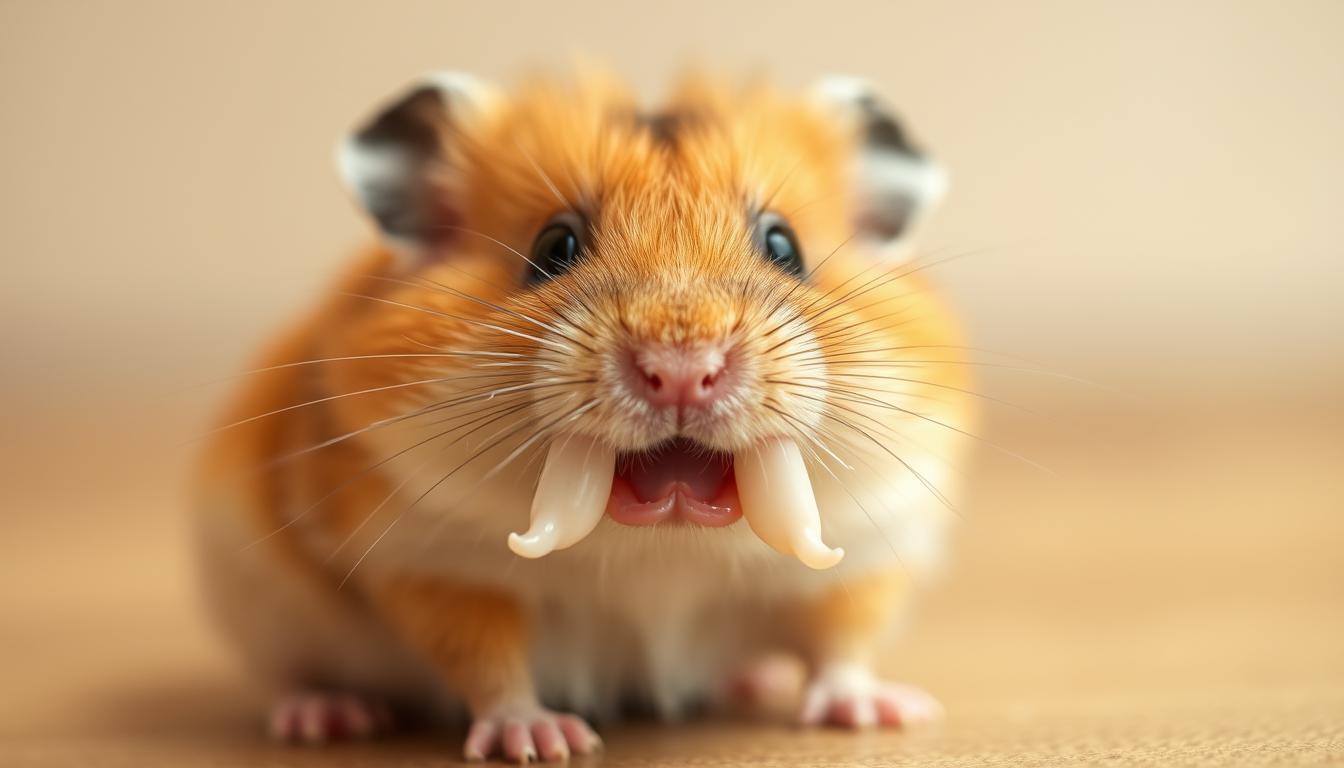Ever heard your hamster chattering with its teeth? This sound can tell you a lot about your pet’s health. We’ll look into why hamsters chatter, what it means, and how to care for them better.
Key Takeaways
- Hamster teeth chattering is a common behavior that can indicate various emotions and states of being.
- Understanding the context and causes of teeth chattering can help pet owners better understand their hamster’s needs and well-being.
- Differentiating between teeth chattering and teeth grinding (bruxism) is important to identify potential health concerns.
- Proper dental care and diet can help prevent excessive teeth grinding in hamsters.
- Recognizing and responding to the various sounds hamsters make can strengthen the bond between pet and owner.
Understanding Hamster Teeth Chattering
Hamster teeth chattering is a fascinating behavior in these lovable rodents. It sounds like rapid clicking or grinding of the teeth. This sound can mean different things. Knowing what it means can help pet owners understand their hamsters better.
What Causes Hamster Teeth Chattering?
Hamster teeth chattering can show several emotions or needs. Here are some common reasons:
- Contentment and happiness: Hamsters may chatter when they’re relaxed and happy, like during petting or snuggling.
- Stress or discomfort: Chattering can also show stress, fear, or discomfort, like when they’re handled too much or in new places.
- Hunger or anticipation: Hamsters may chatter when they’re hungry and waiting for food.
- Bruxism (teeth grinding): Excessive chattering might mean dental problems or health issues.
Differentiating Chattering from Other Noises
It’s key to tell hamster teeth chattering from other sounds like squeaking or chirping. Chattering is a quick, high-pitched click. Other sounds vary more. Watching the context and behavior helps understand the sound’s meaning.
| Sound | Meaning |
|---|---|
| Teeth Chattering | Contentment, stress, hunger, or bruxism |
| Squeaking | Alarm, distress, or communication |
| Chirping | Contentment, playfulness, or social interaction |
Understanding hamster teeth chattering helps pet owners meet their hamsters’ needs. It ensures their happiness and health.
Hamster Teeth Chattering: A Sign of Contentment
Hamster teeth chattering is often a good sign. It means your pet is happy and content. This behavior happens when they’re relaxed, grooming, or playing with you.
When a hamster is content, they make rapid, high-pitched clicking sounds. This is a natural part of their communication. It shows they feel secure and excited around you.
For example, if your hamster chatters while you pet them or give them treats, they’re enjoying it. This shows they feel safe and happy with you. It strengthens your bond and makes your relationship more fulfilling.
“Hamster teeth chattering is a fascinating behavior that can provide valuable insights into your pet’s well-being. By tuning in to these subtle cues, you can better understand and cater to your hamster’s needs, fostering a harmonious and rewarding relationship.”
But not all teeth chattering means they’re happy. Sometimes, it can show stress, fear, or pain. Always watch for changes in their behavior and mood. If you see too much chattering, talk to a vet to make sure they’re okay.
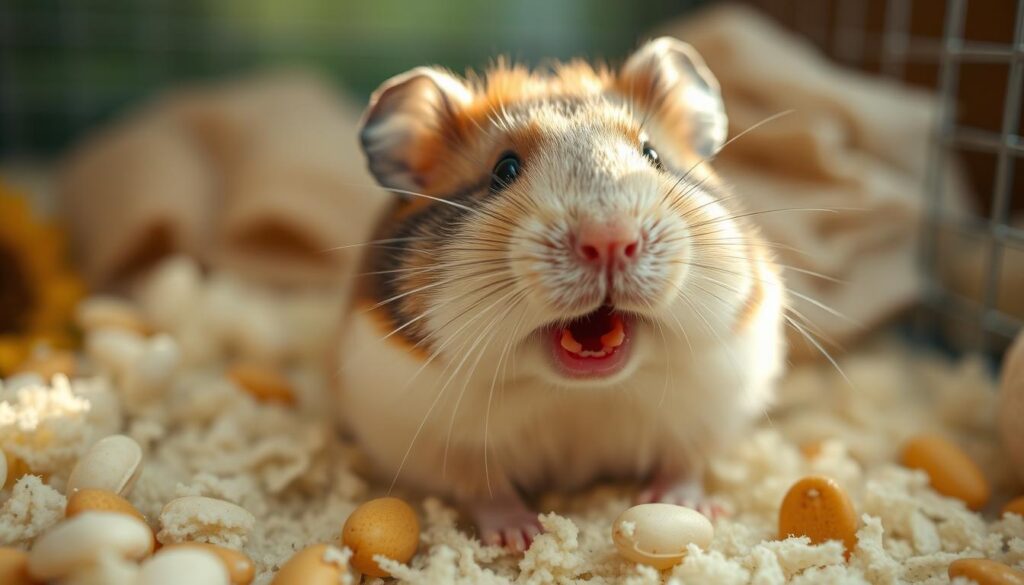
Understanding hamster teeth chattering helps you support their happiness. Always put their well-being first as a responsible pet owner.
Teeth Grinding: When to Be Concerned
Hamsters sometimes chatter their teeth, but too much grinding is a worry. It could mean they have a health problem. Knowing when to worry is key to keeping your hamster healthy.
Identifying Bruxism in Hamsters
Bruxism in hamsters means they grind their teeth a lot. You might hear a “clicking” or “grinding” sound when they’re calm or sleeping. This is different from the chattering they do to talk or show happiness.
Potential Causes of Excessive Teeth Grinding
- Dental problems: Misaligned or overgrown teeth can cause discomfort and lead to excessive teeth grinding.
- Dietary deficiencies: A lack of appropriate dietary fiber or minerals can contribute to dental issues and teeth grinding.
- Stress or anxiety: Stressful environments, changes in routine, or other sources of anxiety can trigger teeth grinding in hamsters.
- Underlying medical conditions: Certain health issues, such as gastrointestinal problems, can sometimes manifest as teeth grinding.
If your hamster grinds their teeth a lot, see a vet. They can find out why and help. Good hamster dental care and fixing hamster health problems can stop teeth grinding noises and bruxism in hamsters.
Watching your hamster’s teeth and health closely is important. Knowing the signs of teeth grinding helps you care for your pet better. This way, they can live a long, happy life.
Rodent Sounds and Their Meanings
As pet owners, knowing the hamster noises and rodent sounds our pets make is key. It helps us understand their hamster behavior and health. Hamsters use different sounds to tell us what they need and how they feel.
Decoding Common Hamster Noises
Hamsters often teeth chatter when they’re happy. But they make many other sounds too. Let’s look at some common hamster noises and what they might mean:
- Squeaks: Squeaks are high-pitched and can mean excitement, fear, or discomfort.
- Chirps: Chirps are melodic and show a hamster’s playful and social side.
- Barks: Barks are deeper and can mean aggression or feeling threatened.
- Hisses: Hissing means a hamster is upset or feels threatened, so we should be careful.
Knowing these rodent sounds helps us meet our hamsters’ needs. This way, we can keep them happy and healthy.
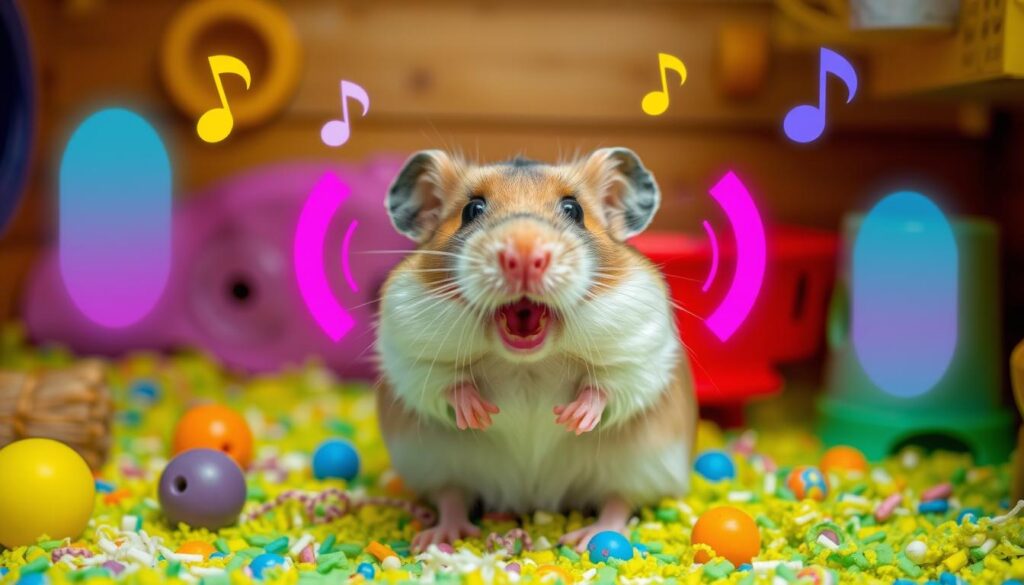
Understanding hamster noises is crucial for caring for our pets. By listening to their sounds, we can build a stronger bond with our hamster pets.
Caring for Your Hamster’s Dental Health
Keeping your hamster’s teeth healthy is key to their happiness. Hamsters need special care because their teeth grow constantly. By taking a few simple steps, you can keep their teeth in top shape.
Proper Diet: The Key to Dental Health
A good diet is vital for hamster dental care. Give them fresh fruits, veggies, and high-fiber pellets and hay. This mix helps wear down their teeth, preventing overgrowth.
Chew Toys: Satisfying Their Dental Needs
Hamsters love to chew, so give them the right toys. Wooden blocks, cardboard tubes, and safe branches are great. Change these toys often to meet their dental needs.
Regular Veterinary Check-ups
Even with home care, vet visits are crucial. Your vet can check your hamster’s teeth and catch any problems early. These visits keep your hamster’s teeth healthy.
| Dental Care Tip | Importance |
|---|---|
| Provide a Balanced Diet | Helps wear down constantly growing teeth and prevent overgrowth |
| Offer Appropriate Chew Toys | Satisfies your hamster’s natural chewing instinct and maintains healthy teeth |
| Schedule Veterinary Check-ups | Allows for professional assessment and early detection of any dental issues |
By following these tips for hamster dental care, you’ll keep your pet healthy. A happy hamster has a healthy mouth. Remember, caring for their teeth is essential for their well-being.
Conclusion
We’ve learned a lot about hamster teeth chattering. It shows us how to care for our furry friends better. By knowing when they chatter, we can make sure they’re happy and healthy.
Watching for changes in your hamster’s behavior is key. This includes teeth grinding and other sounds. It helps spot dental or other health issues early. Getting vet help when needed is important for their health and happiness.
Understanding hamster teeth chattering is vital for great pet care. By being informed and attentive, we can have a wonderful bond with our small pets.

